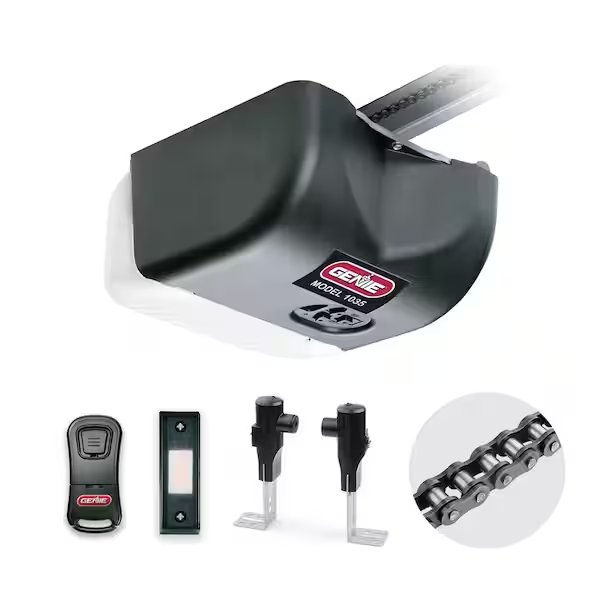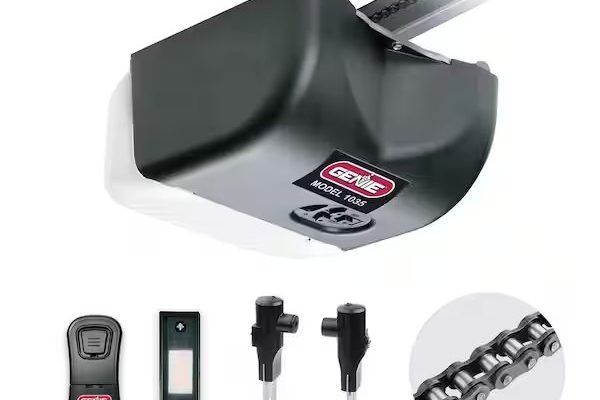
Imagine having a magical little box that opens your garage door with just a push of a button. Whether you’re returning from a long day at work or a weekend grocery trip, having a reliable garage door opener can provide peace of mind. With brands like Chamberlain, LiftMaster, and Genie coming up with innovative gadgets and features, it’s essential to know what technology really counts so you’re not left scrambling with a faulty opener during a sudden rainstorm.
Types of Garage Door Openers
When looking into garage door openers, the first question you might ask is, “What type do I need?” There are several options available, and the main types include belt-driven, chain-driven, and screw-driven openers.
– Belt-Driven Openers: These are quiet and smooth as they use a rubber belt to lift the garage door. They’re ideal for homes attached to garages because of their quieter operation, making them perfect for late-night or early-morning entries.
– Chain-Driven Openers: These are more common and typically less expensive. They use a metal chain and can be noisy. If the garage is separate from the home, this might not matter much.
– Screw-Driven Openers: This type uses a threaded steel rod to lift the door. They require less maintenance and are generally faster than chain-driven openers but can be impacted by temperature changes.
Choosing the right type depends on your priorities: noise levels, budget, and maintenance willingness.
Security Features That Count
Security is crucial, especially since your garage door is both an entry point and a barrier. Modern garage door openers come with a variety of security features that can give you extra peace of mind.
– Rolling Code Technology: This feature changes the access code every time you use the remote. It prevents hackers from stealing the code that opens your garage door, making it significantly safer.
– Smartphone Integration: Many newer models allow you to control the opener through an app on your phone. This means you can check if your garage door is closed while you’re away, and even open it for a friend or service provider without handing over your physical remote.
– Backup Battery: Power outages can be a nuisance, but a backup battery ensures your garage door will still operate even when the lights go out. This small investment can save you a hassle when you least expect it.
In considering these features, you can enhance your home security and mitigate risks associated with traditional openers.
Smart Features and Home Automation
Technology has broadened the functionality of garage door openers significantly. If you’re interested in home automation, you might be thrilled to know about smart garage door openers.
– Voice Control: Many garage door openers now integrate with smart home systems like Amazon Alexa or Google Assistant. Just say, “Open the garage,” and voilà—your door opens without you lifting a finger!
– Geofencing: This feature detects when you’re arriving home based on your smartphone’s location. Your garage door can automatically open as you get close, making it easier than ever to enter without fumbling for your remote or phone.
– Notifications: Smart openers can send alerts to your phone, letting you know if your garage door is left open. If you forget, you can easily close it from anywhere, reducing security risks.
Smart features not only provide convenience but also increase the overall functionality of your garage door.
Battery Backup and Power Options
If you’ve ever dealt with a power outage, you understand how frustrating it can be if your garage door won’t budge. Features like battery backup are essential for ensuring consistent operation.
– Why Battery Backup?: A backup battery will keep your garage door operational even when the electricity is down. This ensures that you can still get in or out of your garage regardless of any unforeseen circumstances.
– Location Considerations: If you live in an area prone to storms, having a reliable battery backup might be a top priority. It’s worth considering how often your power goes out to determine if this feature will be beneficial to you.
– Installing a Backup: Some new garage door openers come with a built-in battery backup. If yours doesn’t, you’ll want to check if you can add one as an accessory.
In today’s world, expecting the unexpected is essential, and battery backup represents a simple solution to a potential problem.
Sensors and Safety Features
Garage door openers aren’t just about getting from A to B; they also ensure everyone’s safety.
– Photo Eye Sensors: These sensors detect whether something is blocking the door’s path. If there’s an obstruction, like a pet or a child, the door won’t close. This feature is critical to prevent accidents.
– Automatic Reversal: If the door encounters resistance while closing, it automatically reverses. Similar to the safety features in modern vehicles, this function is essential in everyday operation.
– Safety Standard Compliance: Make sure your garage door opener conforms to the latest safety standards established by organizations like the Consumer Product Safety Commission (CPSC). These standards help guarantee that the opener you choose operates safely and effectively.
These safety features highlight the importance of choosing a garage door opener that looks after your family as well as your belongings.
Ease of Installation and Use
No one wants to spend hours deciphering complex installation manuals when setting up a garage door opener.
– DIY-Friendly Options: Look for models marketed as DIY. These usually have comprehensive manuals and distance-friendly support lines. They may even come with easy-to-follow videos to guide you through setup.
– User-Friendly Remotes: A remote that’s easy to use is essential. Look for models with large buttons and clear labeling—especially if kids or elderly family members will be using it.
– Programming Flexibility: Some door openers allow you to program multiple remotes or smartphone access points easily. Consider how many people need access to your garage and whether ease of programming is something you value.
A user-friendly design can save time and frustration, turning a potentially confusing setup into a straightforward process.
Durability and Warranty
Considering the long-term investment in a garage door opener, durability should be high on your list of concerns.
– Material Quality: Look for openers made from high-grade materials that resist wear and tear. Metal components tend to be more robust than plastic ones, especially in high-use situations.
– Operator Lifespan: Most garage door openers should last around 10 to 15 years with proper maintenance. Knowing this can help you assess how much to invest initially and what to expect down the line.
– Warranty Coverage: A strong warranty can offer peace of mind. Look for warranties that cover the motor for at least 5 years and other parts for a year or two. This can save you money in the long run if repairs are necessary.
When selecting a garage door opener, keeping durability and warranty considerations in mind will aid in making a sound financial decision.
Noise Level Considerations
Noise can be a vital aspect, especially if your garage is adjacent to living spaces.
– Quiet Operation: Belt-driven models tend to operate the quietest, while chain-driven models might wake up the household if used at odd hours. If noise reduction is a priority, it’s worth considering the type of opener you invest in.
– Sound in Context: Practical testing before purchasing can help gauge how loud an opener actually is during operation. Many local hardware stores have demos you can listen to, giving you a feel for the noise level.
– Maintenance for Quiet Operation: Regular maintenance, like lubricating moving parts, can enhance performance and reduce sound over time.
It’s all about finding a balance between performance and noise, especially if you’re in close quarters.
Cost Considerations
Finally, understanding the cost of garage door openers can help you budget wisely.
– Average Price Ranges: Depending on the features, prices can range from under $200 to upwards of $500. Basic models may save you money upfront, while smart and advanced options might require more investment.
– Long-term Savings: Weigh the cost of features against long-term benefits. For example, if you often forget to close the door, investing in a model with smart technology can prevent potential break-ins.
– Installation Costs: Don’t forget to factor in installation costs if you’re not installing it yourself. Professional installation can range from $100 to $300, depending on your local market and specific needs.
Understanding upfront and hidden costs can save you headaches and help you make a more informed decision.
In summary, choosing the right garage door opener is about more than just convenience. From security features to smart technology, each aspect plays a role in how well the opener can serve you and your family. Knowing what matters most allows you to evaluate choices with greater confidence. With thoughtful consideration, you’ll be equipped to select the garage door opener that truly fits your lifestyle and needs.
